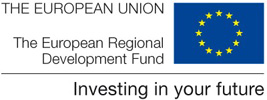A world-class cluster in biotech manufacturing
BIOPRO’s ambition is to find new ways of making biotech production more efficient and sustainable. We can achieve this goal by reducing the consumption of energy and raw materials while improving yields. The following video highlights the visions and benefits of BIOPRO.
BIOPRO is sponsored by Region Zealand, the European Regional Development Fund (ERDF) and the Partners. Startups are part of the project: BioLean, Intubio, BioScavenge, ParticleTech and more.
|
|





